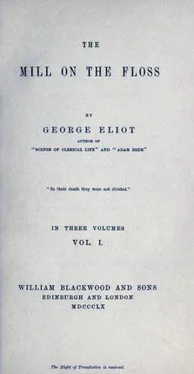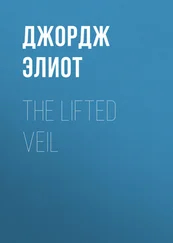Tom never disobeyed his father, for Mr. Tulliver was a peremptory man, and, as he said, would never let anybody get hold of his whip-hand; but he went out rather sullenly, carrying his piece of plumcake, and not intending to reprieve Maggie's punishment, which was no more than she deserved. Tom was only thirteen, and had no decided views in grammar and arithmetic, regarding them for the most part as open questions, but he was particularly clear and positive on one point, — namely, that he would punish everybody who deserved it. Why, he wouldn't have minded being punished himself if he deserved it; but, then, he never did deserve it.
It was Tom's step, then, that Maggie heard on the stairs, when her need of love had triumphed over her pride, and she was going down with her swollen eyes and dishevelled hair to beg for pity. At least her father would stroke her head and say, "Never mind, my wench." It is a wonderful subduer, this need of love, — this hunger of the heart, — as peremptory as that other hunger by which Nature forces us to submit to the yoke, and change the face of the world.
But she knew Tom's step, and her heart began to beat violently with the sudden shock of hope. He only stood still at the top of the stairs and said, "Maggie, you're to come down." But she rushed to him and clung round his neck, sobbing, "Oh, Tom, please forgive me — I can't bear it — I will always be good — always remember things — do love me — please, dear Tom!"
We learn to restrain ourselves as we get older. We keep apart when we have quarrelled, express ourselves in well-bred phrases, and in this way preserve a dignified alienation, showing much firmness on one side, and swallowing much grief on the other. We no longer approximate in our behavior to the mere impulsiveness of the lower animals, but conduct ourselves in every respect like members of a highly civilized society. Maggie and Tom were still very much like young animals, and so she could rub her cheek against his, and kiss his ear in a random sobbing way; and there were tender fibres in the lad that had been used to answer to Maggie's fondling, so that he behaved with a weakness quite inconsistent with his resolution to punish her as much as she deserved. He actually began to kiss her in return, and say,–
"Don't cry, then, Magsie; here, eat a bit o' cake."
Maggie's sobs began to subside, and she put out her mouth for the cake and bit a piece; and then Tom bit a piece, just for company, and they ate together and rubbed each other's cheeks and brows and noses together, while they ate, with a humiliating resemblance to two friendly ponies.
"Come along, Magsie, and have tea," said Tom at last, when there was no more cake except what was down-stairs.
So ended the sorrows of this day, and the next morning Maggie was trotting with her own fishing-rod in one hand and a handle of the basket in the other, stepping always, by a peculiar gift, in the muddiest places, and looking darkly radiant from under her beaver-bonnet because Tom was good to her. She had told Tom, however, that she should like him to put the worms on the hook for her, although she accepted his word when he assured her that worms couldn't feel (it was Tom's private opinion that it didn't much matter if they did). He knew all about worms, and fish, and those things; and what birds were mischievous, and how padlocks opened, and which way the handles of the gates were to be lifted. Maggie thought this sort of knowledge was very wonderful, — much more difficult than remembering what was in the books; and she was rather in awe of Tom's superiority, for he was the only person who called her knowledge "stuff," and did not feel surprised at her cleverness. Tom, indeed, was of opinion that Maggie was a silly little thing; all girls were silly, — they couldn't throw a stone so as to hit anything, couldn't do anything with a pocket-knife, and were frightened at frogs. Still, he was very fond of his sister, and meant always to take care of her, make her his housekeeper, and punish her when she did wrong.
They were on their way to the Round Pool, — that wonderful pool, which the floods had made a long while ago. No one knew how deep it was; and it was mysterious, too, that it should be almost a perfect round, framed in with willows and tall reeds, so that the water was only to be seen when you got close to the brink. The sight of the old favorite spot always heightened Tom's good humor, and he spoke to Maggie in the most amicable whispers, as he opened the precious basket and prepared their tackle. He threw her line for her, and put the rod into her hand. Maggie thought it probable that the small fish would come to her hook, and the large ones to Tom's. But she had forgotten all about the fish, and was looking dreamily at the glassy water, when Tom said, in a loud whisper, "Look, look, Maggie!" and came running to prevent her from snatching her line away.
Maggie was frightened lest she had been doing something wrong, as usual, but presently Tom drew out her line and brought a large tench bouncing on the grass.
Tom was excited.
"O Magsie, you little duck! Empty the basket."
Maggie was not conscious of unusual merit, but it was enough that Tom called her Magsie, and was pleased with her. There was nothing to mar her delight in the whispers and the dreamy silences, when she listened to the light dripping sounds of the rising fish, and the gentle rustling, as if the willows and the reeds and the water had their happy whisperings also. Maggie thought it would make a very nice heaven to sit by the pool in that way, and never be scolded. She never knew she had a bite till Tom told her; but she liked fishing very much.
It was one of their happy mornings. They trotted along and sat down together, with no thought that life would ever change much for them; they would only get bigger and not go to school, and it would always be like the holidays; they would always live together and be fond of each other. And the mill with its booming; the great chestnut-tree under which they played at houses; their own little river, the Ripple, where the banks seemed like home, and Tom was always seeing the water-rats, while Maggie gathered the purple plumy tops of the reeds, which she forgot and dropped afterward; above all, the great Floss, along which they wandered with a sense of travel, to see the rushing spring-tide, the awful Eagre, come up like a hungry monster, or to see the Great Ash which had once wailed and groaned like a man, these things would always be just the same to them. Tom thought people were at a disadvantage who lived on any other spot of the globe; and Maggie, when she read about Christiana passing "the river over which there is no bridge," always saw the Floss between the green pastures by the Great Ash.
Life did change for Tom and Maggie; and yet they were not wrong in believing that the thoughts and loves of these first years would always make part of their lives. We could never have loved the earth so well if we had had no childhood in it, — if it were not the earth where the same flowers come up again every spring that we used to gather with our tiny fingers as we sat lisping to ourselves on the grass; the same hips and haws on the autumn's hedgerows; the same redbreasts that we used to call "God's birds," because they did no harm to the precious crops. What novelty is worth that sweet monotony where everything is known, and loved because it is known?
The wood I walk in on this mild May day, with the young yellow-brown foliage of the oaks between me and the blue sky, the white star-flowers and the blue-eyed speedwell and the ground ivy at my feet, what grove of tropic palms, what strange ferns or splendid broad-petalled blossoms, could ever thrill such deep and delicate fibres within me as this home scene? These familiar flowers, these well-remembered bird-notes, this sky, with its fitful brightness, these furrowed and grassy fields, each with a sort of personality given to it by the capricious hedgerows, — such things as these are the mother-tongue of our imagination, the language that is laden with all the subtle, inextricable associations the fleeting hours of our childhood left behind them. Our delight in the sunshine on the deep-bladed grass to-day might be no more than the faint perception of wearied souls, if it were not for the sunshine and the grass in the far-off years which still live in us, and transform our perception into love.
Читать дальше












